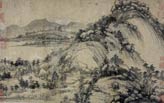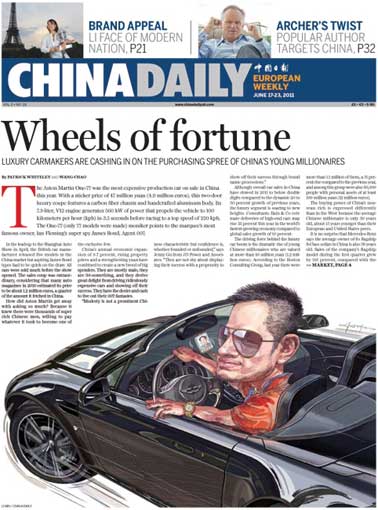Running with the Beijingers
Updated: 2011-06-17 11:18
By Liu Xiaozhuo (China Daily European Weekly)
The institute also helps students find jobs by introducing candidates to recruiting companies.
Spanish-speaking Chinese have also used their new skills in other ways. In the lead-up to the 2008 Beijing Olympic Games, Gonzalez Puy's team provided Spanish classes to hundreds Chinese volunteers so they could better serve visitors from Spanish-speaking countries.
During that period, Cervantes Institute also held an exhibition of Picasso's paintings as part of the Beijing Olympic Games celebrations.
Gonzalez Puy first came to China in 1979 but had already developed a strong affection toward the nation.
As a young history student in Spain she began taking more interest in China after reading the novels of Pearl Buck, a Nobel-winning writer who lived in China in the 1930s. Her epic works, such as The Good Earth and Dragon Seed vividly described the lives of Chinese peasants. The books of Chinese author Lin Yutang also gave her much inspiration.
"After I read the books of Pearl Buck and Lin Yutang, I could not help thinking that we really should take more effort to know and understand China," she says.
"China is a large country and Chinese culture has lasted for thousands of years. It is a pity that we know so little about it."
In Spain, she decided to learn Chinese but in the late 1970s, there were no schools offering language lessons. She met an official from the Embassy of China in Spain who recommended a Chinese language college in Beijing so she worked part-time jobs to save money for her next big step.
Her Chinese friends in Spain, moved by her love for China, began teaching her the basics of the language and even a little kungfu. Finally, Gonzalez Puy worked at a Chinese restaurant as part of her preparation.
In 1979, Gonzalez Puy came to Beijing and took to the language like a duck to water. A Peking duck, to be exact. In 1983, after graduating, she won a job at the Spanish Embassy in China as a culture attach and for almost 30 years has dedicated her life promoting Spain on the mainland.
"People in Spain knew little about China in the first years of opening up to the outside world. What happened in China and the stories of the people, are worthy to be introduced to Spanish people," she says.
Gonzalez Puy says the first few years in China as a student were the most challenging. "At that time, there were not many foreign people in China, so Chinese people's attitude toward us was cautious when they met us," she says.
In the early 1980s, before China's opening-up period bloomed, local students had little money and rarely went out to see a movie or eat at a restaurant, and there were very few places to hang out.
Bars and pubs were non-existent and even when the school organized movies, foreign and Chinese students went to different screenings because of the different languages.
She had a hard time connecting with the locals. "My biggest challenge was to make Chinese friends at that time. I did not expect it would be so difficult. I felt a little depressed," Gonzalez Puy says.
But as the 1980s rolled along, China began to change as a new generation discovered Western art forms and lifestyles. Gonzalez Puy, together with a growing number of expats set up in Beijing, held art exhibitions, mini concerts and parties at their homes. As a result, the seeds of new friendships were planted. She later married a Chinese man.
"Now, most of my friends are Chinese," she says. "Many Spanish stay in China for two or three years and then go back to Spain.
"If I only made friends with them, I'd have to change friends frequently. I think that will drive me crazy, because I like long-lasting friendship with old friends."
Gonzalez Puy knows many young Chinese artists, who show off their talents at the Cervantes Institute.
Theatrical director Meng Jinghui is one such friend. In 2009, he staged Don Quixote, and because of his unique arrangement, it became a popular drama, attracting many Chinese young people.
The institute also hosts exhibitions and lectures. One recent lecture was about 16th century Spanish missionary Diego de Pantoja who came to China during the Ming Dynasty (1368-1644) and spread knowledge of astronomy and music.
"We should not forget those historical figures. It is our responsibility to tell their stories to the next generation," she says.
Beijing life is sweet today but her busy schedule poses one problem.
"I do no have time to learn new things. There are so many interesting things in China, like Peiking opera, but I am
E-paper

Pearl on the Yangtze
Wuxi is considered a town of natural beauty and its motto is "city of water and warmth".
Prose and consternation
Riding on a mystery train
Way of a warrior
Specials

When two are one
After a separation of 360 years, Huang Gongwang's famous Dwelling in the Fuchun Mountains has been made whole again.

Wealth of difference
Rich coastal areas offer contrasting ways of dealing with country's development

Seal of approval
The dying tradition of seal engraving has now become a UNIVERSITY major
